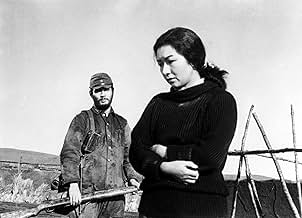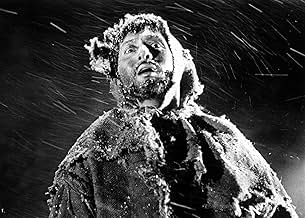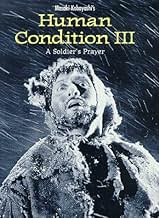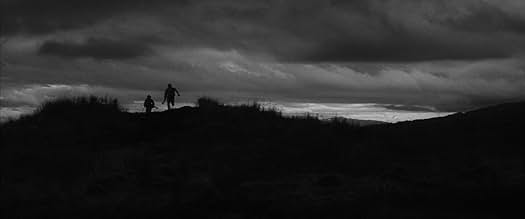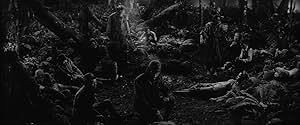La condizione umana: Parte III - La preghiera del soldato
Titolo originale: Ningen no jôken
VALUTAZIONE IMDb
8,8/10
8101
LA TUA VALUTAZIONE
Aggiungi una trama nella tua linguaHis ideals challenged by life as a conscript in war-time Japan's military, a pacifist faces ever greater tests in his fight for survival.His ideals challenged by life as a conscript in war-time Japan's military, a pacifist faces ever greater tests in his fight for survival.His ideals challenged by life as a conscript in war-time Japan's military, a pacifist faces ever greater tests in his fight for survival.
- Regia
- Sceneggiatura
- Star
- Premi
- 5 vittorie totali
Recensioni in evidenza
This trilogy was a grueling and rewarding. It was chilling to watch but I persevered. It was about the conflict between nationalism and the individual struggling for humanism. If you transfer yourself to post WW2 Japan you could see how powerful this film was. It was necessary for the soul searching that was to heal the results of the war.
It is as important today as it was then.
This trilogy affected me deeply after watching it.
There is hardly a frame in the ten hours that does not have any sub-text associated with it.
The ten hour film format has some merits maybe it will catch on.
It is as important today as it was then.
This trilogy affected me deeply after watching it.
There is hardly a frame in the ten hours that does not have any sub-text associated with it.
The ten hour film format has some merits maybe it will catch on.
The Human Condition 10 Hours Long 10 Hours Deep, Without a Doubt the Greatest Anti-War Statement Ever Made... What A Journey.
If you have any remote interest in film go see this right away. Don't bother watching if you are too scared to attempt the entire 10 hours in one sitting. It's worth it and then some. The actor playing Kaji was terrific and each part turns out better than the last (everything really, the acting/camera work... all the bells and whistles just sound better the further in you get). It definitely struck me as something Adolfas Mekas would totally dig, which says a lot. This is a must see. If you decide to bring the wife and kids (or husband and mother-in-law or what- have-you) just be warned: this movie involves a fair amount of human suffering, on and off the screen. -Ed Hellman.
When people think of anti-war films titles such as Platoon, All Quiet on the Western Front and Schindler's List almost immediately come to mind; such films have defined the genre in American culture. However very few directors have provided the perspective from the axis point of view, and fewer still were able to do so in a way that humanizes all countries, not just the protagonist's. Masaki Kobayashi, who is most well known for his samurai pictures such as Seppuku and Samurai Rebellion is able to form such a film, without even a hint of pretentiousness.
The series of films spans nearly ten hours, following a pacifist named Kaji (Tatsuya Nakadai), as he struggles to keep his principles during war times. First as an overseer of a P.O.W. camp, then as a soldier. Due to the length of the film, the level of character development and acting quality, we end up feeling his frustration, pain and triumphs, as each occasion leaves room for both a triumph of the human spirit and subjugation of it. Kaji despises both warfare and violence of all kinds, yet tries to rationalize it for the good of those around him. We become so attached to him and his struggle, that we begin to feel similarly, and as a result we are left with one of the most moving chronicles of the loss that war becomes. I won't spoil anything, but any viewer will be floored by the end, it left me utterly breathless.
So overall I recommend it quite highly, its one of the few great anti-war statements that has aged VERY well in the modern day, and possibly Kobayashi's greatest work. Never slow, yet at the same time never glorifying the action, it is a film that I eagerly await to see re-released.
10/10.
The series of films spans nearly ten hours, following a pacifist named Kaji (Tatsuya Nakadai), as he struggles to keep his principles during war times. First as an overseer of a P.O.W. camp, then as a soldier. Due to the length of the film, the level of character development and acting quality, we end up feeling his frustration, pain and triumphs, as each occasion leaves room for both a triumph of the human spirit and subjugation of it. Kaji despises both warfare and violence of all kinds, yet tries to rationalize it for the good of those around him. We become so attached to him and his struggle, that we begin to feel similarly, and as a result we are left with one of the most moving chronicles of the loss that war becomes. I won't spoil anything, but any viewer will be floored by the end, it left me utterly breathless.
So overall I recommend it quite highly, its one of the few great anti-war statements that has aged VERY well in the modern day, and possibly Kobayashi's greatest work. Never slow, yet at the same time never glorifying the action, it is a film that I eagerly await to see re-released.
10/10.
The third and final part of "The Human Condition" series is the most brutal, breathtaking and deeply disturbing movie of the three. All the beating you saw in the second part cant even come close to how physically, but especially psychologically brutal and disturbing this movie can be. This movie ultimatly playes with the idea that no matter how much of a good person you are, which in the case of our main protagonist, Kaji was shown throughout the last 2 movies, you will always been judged by steriotypes and clichee rather than on your actions and what you have been going through. Is it right to torture and treat people the same way they treated others, even if they have been forced by the military and the zeitgeist of the moment? Is it morally justifiable? This is something everyone has to answer for themself, this movie just shows you this idea in an objective manner not really taking any sides.
With watching this series Masaki Kobayashi, finally made the case for him being the best japanese director of the last century in my opinion. And it also made the case for Tatsuya Nakadai being the best actor of the last century. The emotions this man can convey with this performance by far surpass anything I have seen from any other japanese actor of the last century. The character development Kaji endured throughout the series but especially through this final part was written perfectly and absolutely believably portrayed.
With watching this series Masaki Kobayashi, finally made the case for him being the best japanese director of the last century in my opinion. And it also made the case for Tatsuya Nakadai being the best actor of the last century. The emotions this man can convey with this performance by far surpass anything I have seen from any other japanese actor of the last century. The character development Kaji endured throughout the series but especially through this final part was written perfectly and absolutely believably portrayed.
Lo sapevi?
- QuizIs the first Japanese movie in stereo.
I più visti
Accedi per valutare e creare un elenco di titoli salvati per ottenere consigli personalizzati
- How long is The Human Condition III: A Soldier's Prayer?Powered by Alexa
Dettagli
- Data di uscita
- Paese di origine
- Lingue
- Celebre anche come
- The Human Condition III: A Soldier's Prayer
- Luoghi delle riprese
- Rishiri-Rebun-Sarobetsu National Park, Hokkaido, Giappone(The final scene was shot on the Sarobetsu Plain.)
- Aziende produttrici
- Vedi altri crediti dell’azienda su IMDbPro
- Tempo di esecuzione3 ore 10 minuti
- Colore
- Proporzioni
- 2.35 : 1
Contribuisci a questa pagina
Suggerisci una modifica o aggiungi i contenuti mancanti

Divario superiore
What is the German language plot outline for La condizione umana: Parte III - La preghiera del soldato (1961)?
Rispondi
